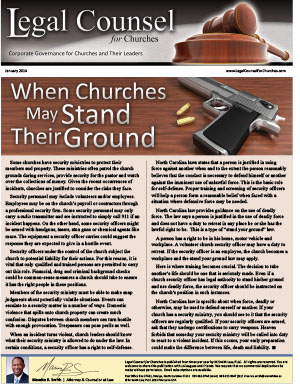Some churches have security ministries to protect their members and property. These ministries often patrol the church grounds during services, provide security for the pastor and watch over the collections of money. Given the recent occurrences of incidents, churches are justified to consider the risks they face.
Security personnel may include volunteers and/or employees. Employees may be on the church’s payroll or contractors through a professional security firm. Some security personnel may only carry a radio transmitter and are instructed to simply call 911 if an incident happens. On the other hand, some security officers might be armed with handguns, tasers, stun guns or chemical agents like mace. The equipment a security officer carries could suggest the response they are expected to give in a hostile event.
Security officers under the control of the church subject the church to potential liability for their actions. For this reason, it is vital that only qualified and trained persons are permitted to carry out this role. Financial, drug and criminal background checks could be common-sense measures a church should take to ensure it has the right people in these positions.
Members of the security ministry must be able to make snap judgments about potentially volatile situations. Events can escalate to a security matter in a number of ways. Domestic violence that spills onto church property can create much confusion. Disputes between church members can turn hostile with enough provocation. Trespassers can pose perils as well.
When an incident turns violent, church leaders should know what their security ministry is allowed to do under the law. In certain conditions, a security officer has a right to self-defense.
North Carolina laws states that a person is justified in using force against another when and to the extent the person reasonably believes that the conduct is necessary to defend himself or another against the imminent use of unlawful force. This is the basic rule for self-defense. Proper training and screening of security officers will help a person form a reasonable belief when faced with a situation where defensive force may be needed.
North Carolina law provides guidance on the use of deadly force. The law says a person is justified in the use of deadly force and does not have a duty to retreat in any place he or she has the lawful right to be. This is a type of “stand your ground” law.
A person has a right to be in his home, motor vehicle and workplace. A volunteer church security officer may have a duty to retreat. If the security officer is an employee, the church becomes a workplace and the stand your ground law may apply.
Here is where training becomes crucial. The decision to take another’s life should be one that is seriously made. Even if a church security officer has legal authority to stand his/her ground and use deadly force, the security officer should be instructed on the church’s position in such instances.
North Carolina law is specific about when force, deadly or otherwise, may be used to defend oneself or another. If your church has a security ministry, you should see to it that the security officers are regularly qualified. If your security officers are armed, ask that they undergo certifications to carry weapons. Heaven forbids that someday your security ministry will be called into duty to react to a violent incident. If this occurs, your early preparation could make the difference between life, death and liability.

